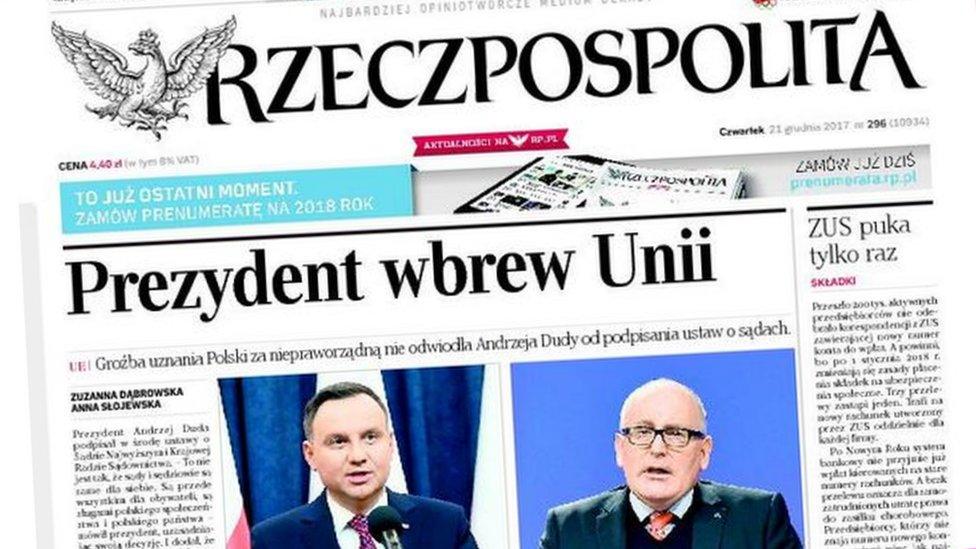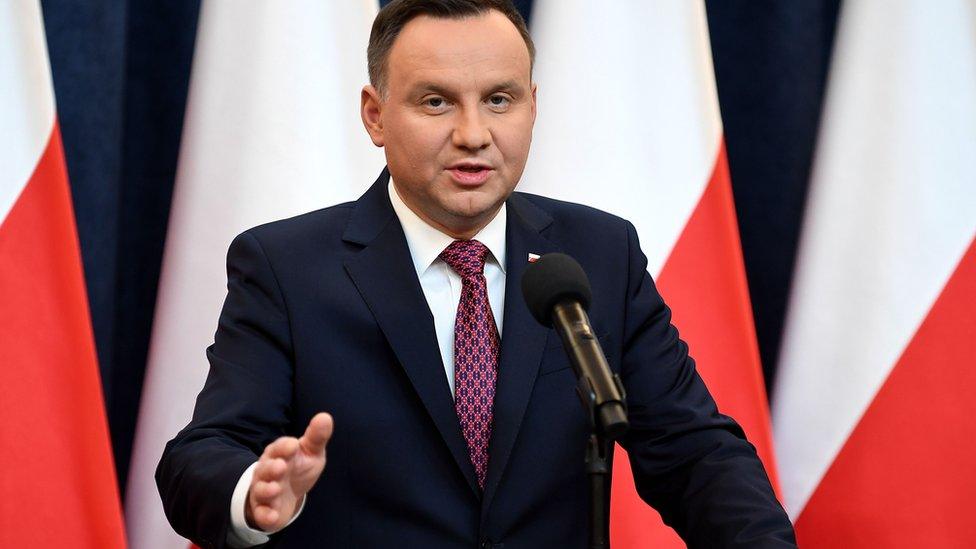Press fears 'Poexit' over Poland-Europe row
- Published

Poland's Rzeczpospolita: President against the Union
Press in Europe fear "Poexit" - Poland leaving the European Union - after the European Commission's decision to initiate sanctions over Poland's controversial judicial reforms.
Brussels says the reforms allow the Polish government to "interfere significantly" in the judiciary and endanger the fundamental values of the European Union.
Even pro-government media in Poland fears that the affair will end in disaster for Poland, saying there could be an avalanche of bad consequences for the country.
And papers across the continent use the same sort of language - speaking of "nuclear options" and "big guns" as if this is the first salvo of a battle.
'Judgement Day'
Polish papers were concerned by the governments defiant, inflexible approach in the face of foreign criticism.
Rzeczpospolita, external, often supportive of the incumbent government, said that current Polish politics is a fast car "speeding towards a wall for months now and has finally spectacularly crashed into it".
Triggering Article 7 of the Union Treaty against Warsaw is "the first stone that could start an avalanche of catastrophic consequences" for Poland, Rzeczpospolita says.
Pro-opposition daily Gazeta Wyborcza, external referred to the row between Poland and the EU as "Judgement Day", accusing the government of "lacking a sense of shame whatsoever... trampling people's will".
But the government won't be too afraid of European Commission's sanctions, says Gazeta Wyborcza. The ruling party sees the row with Brussels as an "opportunity to spread dissatisfaction with the EU among Poles," and is "calling the European Commission's bluff".

Poland's President Andrzej Duda has signed judicial reforms that the EU insists undermine the rule of law
Nuclear option
The row marks "a new low" in Warsaw's relations with the EU and is fraught with unpredictable consequences, according to German press.
"After Brexit, a Poexit could be the final consequence," daily Sueddeutsche Zeitung, external said.
"If the majority in Poland no longer wants to abide by the law, then the country has to leave the EU. After Brexit, the EU could soon experience its next big tragedy," the paper said, adding that "the country is likely to be as divided as the British before the Brexit decision".
Die Welt called the Commission's decision the "nuclear option", external, going on to say that "Never before has the strongest weapon in the EU's treaty been activated. If this happens, it will become painfully clear that the EU is in fact almost defenceless if a member state persistently refuses to obey," it said.
"If Poland had not already been an EU member, it would not have been accepted at the moment," lawyer Thomas Giegerich told the paper.
Heavy artillery
Brussels is unleashing its "heavy artillery" against Poland, according to Isabelle Ory, the correspondent of France's centre-right Le Figaro, external.
Although the Polish authorities say they are ready for talks, she says "they have not really budged an inch", noting that President Andrzej Duda made a point of signing the last two controversial laws on Wednesday night.
Ms Ory thinks the European Commission will try to break the "Article 7 deadlock" by linking the disbursement of Structural Funds - "real manna from Heaven for Poland" - to showing respect for the values of the European Union.
There's combative language in Spanish press too. "Brussels starts a war with Poland over an attack on the rule of law," ABC newspaper, external says; while El Pais, external says the European Commission "pressed the EU's nuclear button" for the first time against Warsaw.
Hungarian support
Hungary has already said it will veto any EU action that risks Poland losing its right to vote in Brussels. Today, pro-government Magyar Hirlap, external carries comments by ruling Fidesz party press chief Balazs Hidveghi, who brings another thorny issue - migrants - firmly into the mix.
He calls the EC action against Poland "proof of Brussels' efforts to punish the countries that oppose the settlement of migrants in Europe and the mandatory resettlement quota scheme".
"Hungary rejects the EU's way of using legal procedures for exerting political pressure," he says.
BBC Monitoring, external reports and analyses news from TV, radio, web and print media around the world. You can follow BBC Monitoring on Twitter, external and Facebook, external.